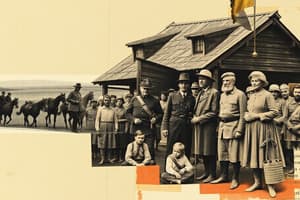Podcast
Questions and Answers
What are the four causes of the Civil War?
What are the four causes of the Civil War?
- One Union vs state's rights (correct)
- The election of President Lincoln (correct)
- Slavery (correct)
- The growing differences between the North and the South (correct)
What are abolitionists?
What are abolitionists?
People who did not believe in slavery nor colonization.
What was Bleeding Kansas?
What was Bleeding Kansas?
A conflict where abolitionists and pro-slave voters fought over the slavery issue as Kansas determined its status.
What was initially the capital of the Confederacy?
What was initially the capital of the Confederacy?
The Missouri Compromise of 1820 allowed all new northern states to be slave states.
The Missouri Compromise of 1820 allowed all new northern states to be slave states.
What was the Confederacy?
What was the Confederacy?
Who were the leaders of the Confederacy?
Who were the leaders of the Confederacy?
What is the significance of the Dred Scott case?
What is the significance of the Dred Scott case?
Who was Chief Justice Richard B. Taney?
Who was Chief Justice Richard B. Taney?
What happened in the Election of 1860?
What happened in the Election of 1860?
What is federalism?
What is federalism?
Who was Frederick Douglass?
Who was Frederick Douglass?
What did Harriet Beecher Stowe do?
What did Harriet Beecher Stowe do?
Who was John Brown?
Who was John Brown?
What was Lincoln's primary goal throughout the war?
What was Lincoln's primary goal throughout the war?
The Border States included Delaware, Maryland, West Virginia, Kentucky, and _____
The Border States included Delaware, Maryland, West Virginia, Kentucky, and _____
What did states' rights imply in the context of Civil War?
What did states' rights imply in the context of Civil War?
Who was William Lloyd Garrison?
Who was William Lloyd Garrison?
What does it mean to secede?
What does it mean to secede?
What did the laws and Constitution imply about slavery?
What did the laws and Constitution imply about slavery?
What is colonization in the context of slavery?
What is colonization in the context of slavery?
What was the three-fifths compromise?
What was the three-fifths compromise?
What were the Federal Fugitive Slave Laws?
What were the Federal Fugitive Slave Laws?
Who were bounty hunters?
Who were bounty hunters?
What was the Compromise of 1850?
What was the Compromise of 1850?
Who was Sojourner Truth?
Who was Sojourner Truth?
Who was Harriet Tubman?
Who was Harriet Tubman?
What does popular sovereignty refer to in the context of slavery?
What does popular sovereignty refer to in the context of slavery?
Flashcards are hidden until you start studying
Study Notes
Causes of the Civil War
- Four main causes: slavery, states' rights versus national unity, regional differences, and Lincoln's election.
Abolitionists
- Advocates against slavery and colonization; pivotal in anti-slavery movements.
Bleeding Kansas
- Violent clashes erupted in Kansas over the decision to allow slavery as statehood was declared.
Capital of the Confederacy
- Initially Montgomery, Alabama; later moved to Richmond, Virginia.
Missouri Compromise (1820)
- Missouri became a slave state, Maine a free state; established boundaries for slavery in future states.
Confederacy
- Formed by southern states that seceded, known as the Confederate States of America (CSA).
Leaders of the Confederacy
- President: Jefferson Davis; Vice President: Alexander Stephens.
Dred Scott Case
- Supreme Court ruling that declared enslaved man Dred Scott as property, intensifying the slavery debate.
Chief Justice Richard B. Taney
- Ruled in favor of slavery in the Dred Scott case, affecting the Supreme Court's credibility.
Election of 1860
- Lincoln's election led Southern states to secede, starting with South Carolina.
Federalism
- System of government with a strong central authority sharing powers with states.
Frederick Douglass
- Formerly enslaved abolitionist, editor of "The North Star", influential voice advocating against slavery.
Harriet Beecher Stowe
- Wrote "Uncle Tom's Cabin", which revealed harsh realities of slavery and garnered support for abolition.
John Brown
- Radical abolitionist known for his raid on Harper's Ferry aimed at initiating a slave uprising; executed for treason.
Preserving the Union
- Lincoln's primary goal during the Civil War, emphasizing national unity over slavery issues.
Border States
- States with divided loyalties: Delaware, Maryland, West Virginia, Kentucky, and Missouri.
States' Rights - Nullification
- Southern states sought to reject certain federal laws, advocating for state sovereignty.
William Lloyd Garrison
- Prominent abolitionist and editor of "The Liberator", pushing for immediate abolition.
Secede
- To withdraw from a political entity, particularly the Southern states leaving the Union.
Legal Stance on Slavery
- U.S. laws indicated slavery was lawful, slaves were property, and slave owners had protections.
Colonization
- Proposed solution to the issue of slavery, suggesting relocation of free blacks to Africa.
Three-Fifths Compromise
- Agreement allowing states to count three-fifths of enslaved individuals for representation in Congress.
Federal Fugitive Slave Laws
- 1793 law mandated return of escaped slaves; 1850 law intensified penalties for aiding escapes.
Bounty Hunters
- Individuals tasked with capturing runaway slaves, motivated by financial rewards.
Compromise of 1850
- California entered as a free state; territories of New Mexico and Utah given the right to decide on slavery.
Sojourner Truth
- Abolitionist and women's rights advocate known for her powerful speeches promoting equality and freedom.
Harriet Tubman
- Renowned for leading enslaved individuals to freedom via the Underground Railroad; known as "Moses".
Popular Sovereignty
- Concept that allows the residents of a territory to decide on issues such as slavery through voting.
Studying That Suits You
Use AI to generate personalized quizzes and flashcards to suit your learning preferences.




